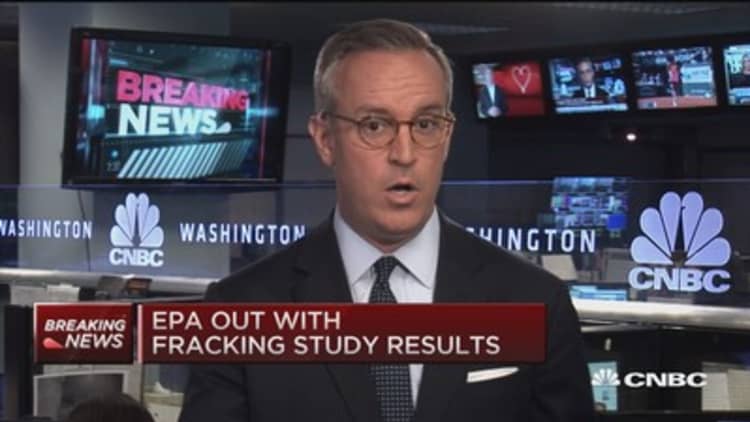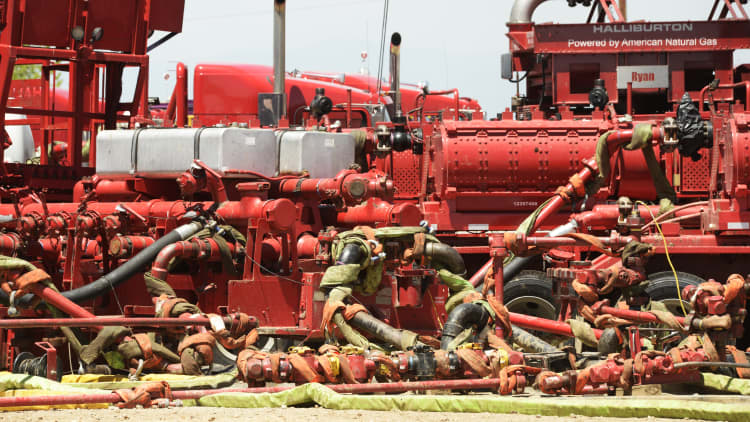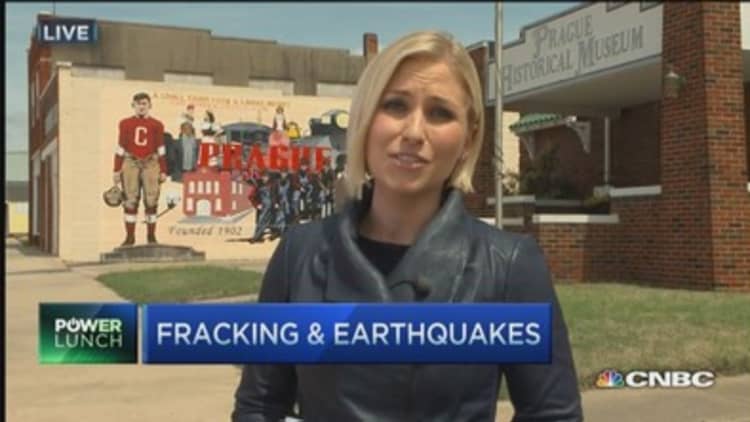


The U.S. Environmental Protection Agency said in a Thursday report that it found no evidence fracking has a "widespread" impact on drinking water.
The EPA report—a draft assessment of its findings—concluded that there are above and below ground mechanisms by which fracking have the potential to impact drinking water resources, but that the number of identified cases were "small" compared to the number of fracking wells.
"We did not find evidence that these mechanisms [of potentially affecting water] have led to widespread, systemic impacts on drinking water resources in the United States," the report said.
Hydraulic fracturing, or fracking, is a process that involves pumping water, sand and chemicals into a well to extract oil or gas. Environmentalists say fracking poses health risks, often citing the affects on drinking water reserves.
In its report, the EPA notes that its findings could have been limited because of an insufficient amount of data and the presence of other possible contaminates that made it impossible to conclude fracking's effects on certain areas.
"The study was undertaken over several years and we worked very closely with industry throughout the process," Tom Burke, EPA's science advisor and deputy assistant administrator of EPA's Office of Research and Development, said on a conference call hosted by the agency.
He added that the limitations in data were not a function of companies' cooperation, but were—in many instances—a question of scientific capabilities.
Read MoreFeds take on fracking: What will it cost drillers?
Still, members of the energy industry were already celebrating the report.
"With this new report, it couldn't be clearer that shale development is occurring in conjunction with environmental protection and the claims by anti-fracking activists have been thoroughly debunked," a post from the Independent Petroleum Association of America's outreach campaign said.
In fact, the assessment includes several examples of fracking activities contaminating drinking waters, Burke said, adding that the report is not meant to issue a final conclusion on the process's safety.
"This is a study of how we can best protect our water resources. It's not a question of safe or unsafe," he said.
The EPA report was the result of Congress urging the group to conduct an assessment, and includes meta-analysis of prior studies and original agency research, Burke explained.
He emphasized that the draft assessment is not meant to directly inform policy, but is simply an advance in scientific understanding that can serve as a "foundation for future decisions."

Other than in a few select areas, the report founf fracking's potential impact on drinking water quality is relatively low, but not eliminated.
"Future problems could arise if hydraulic fracturing increases substantially in areas with low water availability, or in times of water shortages," the report said.
In March, the federal government unveiled its first set of fracking safety mandates. Affecting only federal and Indian lands, the Bureau of Land Management rule includes provisions for ensuring groundwater protection though well integrity standards, increased transparency by requiring companies to publicly disclose chemicals they use, higher storage standards, and requiring companies submit more detailed information on preexisting wells.
Read MoreFracking or water? One report says that may be the choice
The BLM estimated that those new policies will cost about $11,400 per well. Industry representatives, however, told CNBC they see compliance as potentially much more expensive.
The industry has decried the regulatory changes as redundant and based on unsubstantiated concerns. Two groups, the Independent Petroleum Association of America and the Western Energy Alliance, filed a lawsuit against the rule in the U.S. District Court for the District of Wyoming.
The study is set to be finalized after it is reviewed by the Science Advisory Board and submitted for public review and comment, the agency said in a press release.


